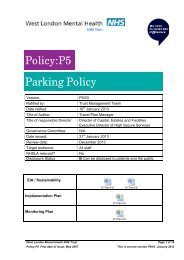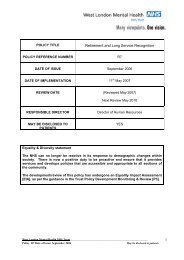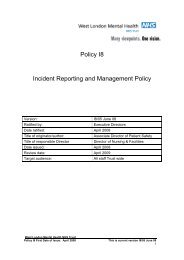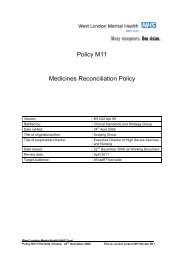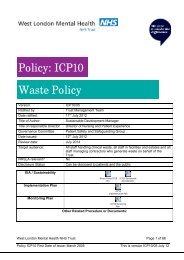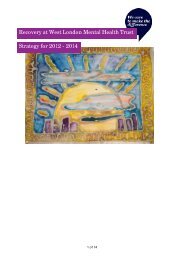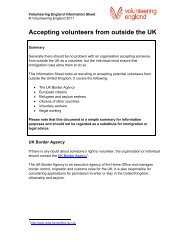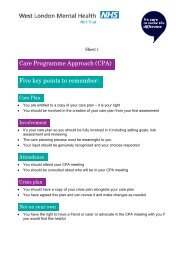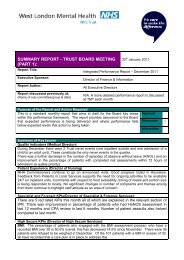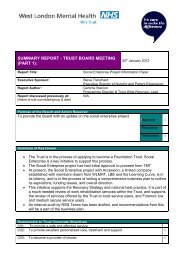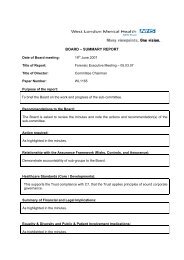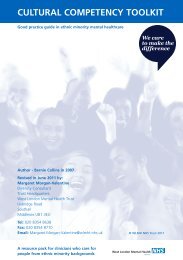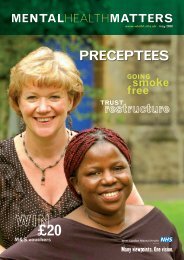MHM May 2007 - West London Mental Health NHS Trust
MHM May 2007 - West London Mental Health NHS Trust
MHM May 2007 - West London Mental Health NHS Trust
You also want an ePaper? Increase the reach of your titles
YUMPU automatically turns print PDFs into web optimized ePapers that Google loves.
<strong>MHM</strong> issue <strong>May</strong> 07 AW 8/5/07 12:32 Page 1every picturetells a storyMENTALHEALTHMATTERSwww.wlmht.nhs.uk may <strong>2007</strong>From slave trade to fair tradeAn event was held in the Ealing chapel incommemoration of the bi-centennial ofthe abolition of the slave trade.Poet David Neita gave an overview of thetransatlantic slave trade and recited someof his poetry. Professor Elizabeth Anionwudrew parallels between slavery andnursing, and Nora Cranston of AmnestyInternational talked about the trafficking ofwomen. Meena Patel from the SouthallBlack Sisters provided a local perspective.Pictured from the left is Professor Elizabeth Anionwu,David Neita and Nora Cranston.<strong>MHM</strong> around the worldMariko Hinneh from Avebury ward, and hercolleague Patience Chakadini from Tagoreward in the RSU are pictured on holiday inJapan.The photograph was taken at a trainstation by Itami domestic airport, Osaka, Japan.Send your holiday photographs tocommunications@wlmht.nhs.ukCarlyle <strong>London</strong>, the trust’s lead nurse for education andtraining presented a paper on mental health serviceusers' perception of stigma, using a study of communityand in-patient service users.This was at the UK Public<strong>Health</strong> Association annual conference in Edinburgh.Send an email to Carlyle at Carlyle.london@wlmht.nhs.ukif you would like to know more.CARDINAL CENTRESERVICE USERINTERVIEWMEET THECOMPLAINTS TEAM24 MENTALHEALTHMATTERS<strong>Mental</strong> <strong>Health</strong> Matters is printed on paper sourced fromsustainable forests and is 50% elemental chlorine free (ECF)
<strong>MHM</strong> issue <strong>May</strong> 07 AW 8/5/07 12:32 Page 3We have received the feedbackfrom the staff survey. I am pleasedto report that the trust hasimproved in 18 of the areaslooked at. More staff reporthaving been trained in key areasincluding equal opportunities,disability awareness, harassmentand bullying. Compared to thistime a year ago less of you areplanning to leave the trust in thenext twelve months and managersare getting better at givingfeedback to their staff. It is goodnews that more staff feel that thetrust treats people fairly whenreporting an error.The feedbackfrom the survey is more positivethis year and I attribute this tothe fact that we have invested incommunications to make this amore open organisation and intraining opportunities for staff andmanagers through our newprogramme of managementdevelopment. More informationabout the findings of the surveywill be shared with staff throughour usual channels of internalcommunication.The trust’s new travel plan for theEaling site is up and running.SIMONSAYSThe launch of the trust’s shuttlebus is an indicator that we arere-investing the revenue from thepermits into green transportoptions for staff.We would liketo make our green travel plan along-term one and so if the bus isto be a success we wouldencourage as many staff aspossible to use it and importantlyat this early stage to let it beknown if you have ideas on howwe can improve the service.I would like to acknowledge theproblems we have been havingwith RiO over the past fewmonths. I realise how frustratingthis has been but I would like toreassure you that this has beenraised at the highest level with BT(our service provider). I hope thatby the time this magazine goes topress BT will have resolved all ofthe issues.I continue to work with theDepartment of <strong>Health</strong> aroundoptions on the way forward withour Foundation <strong>Trust</strong> (FT) bid.WORKING IT OUTis the title of the trust's annual public meeting on10 July, which will concentrate on mental health andemployment.The meeting will be preceded by anevent organised by the work rehab team at Ealing,with Jobcentre Plus and local employers on hand toWe are trying to find a route thatwill allow the whole of the trustto become an FT.Although this isthe ideal solution for us there isan alternative which is to remainas an <strong>NHS</strong> trust but with theability to benefit from some ofthe freedoms available to FTorganisations. Ultimately it is forthe chief executive of the <strong>NHS</strong>and the Secretary of State tomake the final decision, but Icontinue to work with the twotrusts in the same position as usto come up with a solution whichwould be acceptable to all.As this is the first magazine of thenew financial year, I would like toend on a note of thanks to youfor working so hard to meet thetarget we had for last year to endwith a £2.3m surplus.We will getthe surplus back this year and westart the <strong>2007</strong> financial year on amuch stronger footing than in thepast as 90% of the money wehave to spend this year hasalready been agreed. In previousyears we have not had thisinformation at such an early stage.This is not to say that there willnot be challenges and risks in theyear ahead.The <strong>NHS</strong> will continueto attract political attention andas always we each have aresponsibility to ensure weprovide quality services within theresources available.discuss issues around mental health and employment.The annual meeting itself will include a dramaperformance, a video and a number of presentationsaround the employment theme.welcomeMENTALHEALTHMATTERSMAY<strong>2007</strong> You may have noticed that this issue of <strong>Mental</strong> <strong>Health</strong> Matters is easierto read than before.This is because information sent out by the trust willnow be printed in font size12.We have a duty under the Disability Discrimination Act to take steps toimprove the accessibility of our documents for people with sightdifficulties and the Royal National Institute for the Blind recommends aminimum of 12 point.In this issue of the magazine I focus on one of the hot topics of the month which is the greentravel plan. Board secretary Abby Fadina is pictured on the cover, arriving at work. Later in themagazine two members of staff talk about their experiences of hiring bicycles from the physicalactivity team for their journeys to and from work.You will find a summary of the <strong>Mental</strong> Capacity Act on page 11 and on page 17 we continue ournew series of interviews with service users. My colleague Matt interviewed Tracey who got thehelp she and her son needed at the Cassel.As always keep in touch and let me know what is happening in your part of the trust.You can email me at Tara.Ferguson-Jones@wlmht.nhs.ukwww.wlmht.nhs.ukThe Quality Awards is an annual scheme which provides theopportunity to acknowledge exceptional contributions made byindividual members of staff and teams, both clinical and nonclinical.Nominations are made by staff, service users and carers.Cecilia Coleshaw, communications manager says,“The <strong>2007</strong>scheme will be launched in <strong>May</strong>, with a new electronicnomination form that will be accessed on the trust's website.Hard copy forms will still be available for people who don't havecomputer access, so look out for the posters in reception areas.“The eleven award categories will be the same as for last year,though this year's form is being redesigned to make it easier fornominators to focus on the judging criteria.“The awards ceremony will take place in Hammersmith on Friday9 November.The videos that were produced featuring last year’swinners can now be viewed on the home page of the trust’swebsite.Start thinking now about who you would like to nominate!02 MENTALHEALTHMATTERS MENTALHEALTHMATTERS 03
<strong>MHM</strong> issue <strong>May</strong> 07 AW 8/5/07 12:33 Page 15MYWORKINGLIFEPEDALPOWERThe Ealing physical activity team is lending bicycles tostaff for free!Anna Smith physical activity co-ordinator says, “We can affordto do this because we submitted a bid to Transport for<strong>London</strong>’s Good Going scheme last year and secured funds topurchase bicycles and cycling equipment.Transport for <strong>London</strong>gave grants to organisations like ours to encourage <strong>London</strong>ersto cycle to and from work.Gail MillerJob title?Associate director for violence reduction.“We urge staff to call us if they would like to make use of oneof the bicycles – we have many more to lend out! In time wewould also like to make them available to service users.”Function of the job?To maximise the safety of staff and patients atWLMHT.Career path?I started doing a law degree when I left school but didnot like it! I had a summer job as a temporarynursing assistant working with older adults and reallyenjoyed that so I went on to do my nurse training.This resulted in a number of years in mental healthnursing. Later I did a degree in cognitive behaviouraltherapy at Stirling University. I was a teacher in theprevention and management of violence for manyyears. I moved to <strong>London</strong> in 2002 taking up a nurseconsultant post at SLAM (South <strong>London</strong> andMaudsley Foundation <strong>Trust</strong>), specialising in violencereduction. In 2005 I was seconded to the <strong>NHS</strong>Security Management Service as a mental healthmanager, before coming to WLMHT six months ago.Like about the job?I like the variety, the fact that it is challenging andthat there is a lot to do. I like getting to meet lots ofdifferent people.Dislike about the job?I dislike some elements of the bureaucracy and thefact that I’m not doing much clinical work at themoment as I’m developing strategy. Fortunately I amhoping to get a small case-load in the near future, sothat I don’t lose touch.Describe an average week at work?My work requires me to visit a number of sites eachweek. I’m involved in a number of ongoing projectsaround staff training and service development. Ispend much of my time working with the trust’sservices, for example making sure that the trust islinked in with the national agenda. I also answer avery large number of emails each week.What are your priorities for the future?Making sure that people are aware that it is a priorityfor the trust to make staff feel safe, secure, confidentat work and valued.Also that service users and their carers feel confidentthat care is being provided in a safe, therapeuticenvironment.If you weren’t here, what would you be doing?I’d be a backing dancer on Take That’s tour.What did you have for breakfast today?A banana.What would you do if you won the lottery?I would fund an expedition up Everest and get someof my friends to come with me, if they fancied it!Krystna Niedenthal, PA in the RSU“When I heard about the car parking restrictions at work I wasinitially quite devastated. It takes me a maximum of 20 minutesto drive to work whereas coming in by bus can take an hour, ormore, as there is no direct route.“A colleague told me about the trust’s bicycle hiring scheme.I am delighted with my bicycle and think the scheme is fantastic.Not only is it free of charge but the physical activity team doesany bicycle maintenance which is required. I’ve also been ableto borrow a helmet, lights, bell and lock. I now cycle when theweather is decent and have even devised a new route to workvia back streets and through parks.The journey here takes lessthan half an hour, is good for my health and much morepleasant than going by bus.”Richard Ball, dietitian“When I was living in Australia, I did lots of cycling. I wasdelighted to hear about the trust’s scheme as getting a bike wassomething I’d been considering but never got around to. I oftenuse the trust gym and whilst there the instructors told me aboutthe scheme. I’m very health and fitness conscious and do lots ofrunning and cross trainer work, so adding cycling to the programis a bonus as it’s good to vary aerobic exercise. I can either takethe canal which is beautiful this time of year or the road whichcan be entertaining - having friendly discussions with car driverswho need work on their bike awareness! Either way I come towork in much better shape than if I’d taken the bus.There areshowers in the gym that I can use when I need to.”Above: Krystna Niedenthal Below: Richard Ball14 MENTALHEALTHMATTERSMENTALHEALTHMATTERS 15
<strong>MHM</strong> issue <strong>May</strong> 07 AW 8/5/07 12:33 Page 17GOOD DAYS, BAD DAYS:LIVING WITH MENTAL ILLNESSIn <strong>May</strong> 2005, Tracey and her twelve year old son were referred to theCassel to help them overcome loss and reconnect with their unspokenemotions. Eleven months later, they left with a new outlook on life,having rediscovered their relationship with each other.WITH ALITTLE HELP...The work done by trust employees issupported by an enthusiastic bank ofvolunteers and at any one time there arearound 30 helping out at the trust.If your workplace could do with some support,get in touch with the volunteers’ office.People interested in volunteering go through arigorous application process similar to the staffone.This includes a lengthy application formand interview, two references are checked, aCRB check, a full day of personal safety trainingand a three-day induction before commencing.Says voluntary service manager Anne Ronan,“We seek volunteers from differentbackgrounds, abilities, cultures, genders, agesand outlooks. For example at the moment wehave a number of students on our books,health professionals from other countries whowish to gain experience and some formerservice users, who want to give somethingback to the service they have benefited from.”For information about volunteering contactthe volunteers’ office on 020 8354 8758or email volunteers@wlmht.nhs.ukTop: A group of the most recent volunteer recruits.Below: Volunteer Elieen Watkins at work in the Pegasus Centre, Ealing.Volunteers' week will be celebratedfrom 1-7 June. The week aims to thankvolunteers for the work they do andpromote innovative ways of recruitingmore. There will be displays at thetrust promoting the work done by ourown volunteers.“My son had been in art therapyfor the trauma and emotionaldifficulties he had as a result of apast loss. I was told we neededmore intensive therapy for bothme and my son and that’s whenwe found out about the Cassel.”Tracey was initially uncertainabout what the Cassel would belike, but knew that she desperatelywanted to help her son.“When we first arrived it was verydaunting and I didn’t know whatto expect. But we met thetherapist and our nurse and theywere really supportive andwelcoming. It was a stressful timebut I knew it was worth it to getthings sorted.“The Cassel was like a therapeuticcommunity where everyonehelped each other and were verysupportive.You talked about thethings you needed to talk aboutand they helped you workthrough them.”Speaking with people who couldempathise with her situationhelped Tracey to unlock herfeelings and begin to relate withothers.“While the children were in theschool, we had workgroups, familyunit groups with other parents,and community meetings. It helpedto be able to talk to others whohad similar experiences and couldunderstand what you were goingthrough.”“I’d like to tell everyone atthe Cassel how much Iappreciate all support theygave us – they did a greatjob. It was difficult andvery emotionally draining,but really worth it.Tracey says that the help she andher son received was life changingand that the Cassel was wherethey needed to be.“There’s a lot of ignorance outthere, and my son had beenbullied and made to feel like anoutcast. But the staff there didn’tjudge us. Now we’re much moreopen and can talk about thingsbefore they become too much tohandle. My son is more stable andno longer in therapy - I feel a realemotional connection with him.”For Tracey, the hardest part of thelast two years has been letting goof her son and allowing him to behis own person.“Before we went to the Cassel, wewere both holding a lot in, and asa parent you want to protect yourchildren. Our relationship was likethat of two adults and they helpedme to be more of a mother.“Of course you don’t stopworrying, but it’s really importantto let him grow. He’s a lot happierand settled now, and I have moreconfidence as a parent as well. I’vebeen doing things that I havewanted to do for years. Nowwe’re moving house, which is anextra bonus - a new beginning.”The gratitude Tracey feels is clearin her voice as she re-emphasisesher feelings about the help shereceived.“I’d like to tell everyone at theCassel how much I appreciate allsupport they gave us – they did agreat job. It was difficult and veryemotionally draining, but reallyworth it.“If people have a chance to gethelp from the Cassel they shouldgrab it with both hands. If I werein the same situation I woulddefinitely do it again.You have tolook ahead and see that noteverything is bad. If you want to,you can change.”Interview by communicationsmanager Matt Barnfield.16 MENTALHEALTHMATTERSMENTALHEALTHMATTERS 17
<strong>MHM</strong> issue <strong>May</strong> 07 AW 8/5/07 12:33 Page 19HISTORYMATTERSTony Hillis wingThe Tony Hillis wing in St Bernard’s was opened in2000 and named in memory of Tony Hillis OBE, aformer deputy director of nursing at the trust.Tony was from Wexford, Ireland and one of tenchildren. He trained as a psychiatric nurse and also ageneral nurse in England and worked for a time inAfrica and Saudi Arabia.Before coming to work at WLMHT in 1998, he hadmade a name for himself, both nationally andinternationally in the world of mental health nursing.He was known for his expertise and wasinstrumental in setting up two units, the BractonCentre which provides a range of specialist forensicmental health services for people in Kent and theReaside Clinic, a medium secure unit in Birmingham.Tony was the nursing lead on the Fallon enquiry(which looked at the personality disorder unit ofAshworth Special Hospital) and was called as anexpert witness in a number of forensic nursingissues.Tony has also published widely about forensicnursing and founded the Forensic PsychiatricNursing Association (FPNA) in 1988.When he arrived at the trust, his brief was to carryout a review of services. During his short time atthe trust before his sudden death in 1999 he wasresponsible for a number of developments andcontributed to improvements in patient care.Before his death Tony was also awarded the OBEfor services to the <strong>NHS</strong> and in particular to forensicpsychiatry.This was a fitting tribute for a man whohas given so much to the <strong>NHS</strong> during his 30 yearsof service.Tony’s wife Gina, remains a member of trust staff.She says, “This is one of three mental health unitsnamed after Tony, as there is also the Tony Hillis Unitin south <strong>London</strong> and Hillis Lodge in Birmingham.“I’m very proud of him that his name lives on in thisway.Tony had a unique style and an intensely strongdesire to improve services for patients. In everythinghe did the needs of the patients were always hisdriving force.”Tony HillisGina Hillis“Favourite smell isscented candles afterdiscovering a shop full ina small country town inNew England and leastfavourite smell is babysick - still in the memoryafter over 30 years.”Brian Graham,vocational servicesmanager, BroadmoorHospital“My favourite smell is roses - such alovely reminder that it's good weather,and that good times are not far away.The smell I most dislike is that ofburnt toast! What a waste of goodfood it brings to mind.”Jeanne Fearn, social worksecretary, RSU“Favourite is the smell of freshly cut grassand least favourite is Tarmac.”Steve Francombe,senior nursepractitioner,older people’s services,CMHT for H&FWhat is your favourite andleast favourite smell?"My favorite smell is anewborn baby - they alwayssmell lovely! My leastfavorite smell is people whohave eaten garlic the nightbefore and still have it ontheir breath!"Wendy Channell, PAto the director of localservices“Favourite is the smell ofbarbeque and leastfavourite is seafood.”Anna Smith, physicalactivityco-ordinator, Ealing“Favourite smell is speedway bikefumes from racing and the worst is afishing rag that my son left in his baitbox over the winter or the smell ofterry towelling nappies being boiled ina galvanised bucket on top of thekitchen stove.”Steve Pitt, receptionist,Broadmoor Hospital18 MENTALHEALTHMATTERSMENTALHEALTHMATTERS 19
<strong>MHM</strong> issue <strong>May</strong> 07 AW 8/5/07 12:33 Page 21teamworksWhilst we all strive to do a good job,occasionally we do not meet the expectationsof service users or their carers.<strong>MHM</strong> met the trust’s complaintsteam.Based at both Ealing and Broadmoor sites the teamdeals with complaints in the form of letters andemails, telephone calls, and occasionally face to facemeetings. PALS (patient advice and liaison service) isthe first port of call for patients with a query orconcern. If the PALS team is unable to resolve an issuethe patient or carer may put their concerns in writingand that’s where the complaints team comes in.Says head of complaints Fiona Mattison,“Our job is tosupport the complaints process, to make surecomplainants receive a timely and appropriateresponse to their complaint. When a complaint isreceived we discuss how best to deal with it to getthe most satisfactory outcome for the complainant.All complaints are acknowledged in writing within twoworking days and a full response provided within 25working days so this process requires careful timemanagement.“Some issues can be dealt with really quickly.For example we had a letter from someone recentlycomplaining that they were discharged from a wardwithout some of their personal property.We went tothe ward, found the property and returned it with aletter that day.”The <strong>NHS</strong> considers that how the trust managescomplaints is a reflection of the quality of servicesprovided. The trust’s chief executive monitors closelythe trust’s performance and letters of response tocomplainants.Fiona says,“The work done by the complaints teamrelies heavily on support from staff all over the trust,as it is in the main, clinical staff and support staff whocarry out the investigations and provide us with theirfindings.We run regular training sessions for staff onhow to carry out investigations and refresher trainingcourses are held regularly.We are guided in what wedo by the <strong>NHS</strong> complaint regulations.Fiona adds,“Part of our role is to make sure theinvestigation is completed on time and a goodcomprehensive response is communicated to thecomplainant. This is where we most appreciate thesupport that we receive from those members of staffwho are providing direct patient care.“Although we do on occasion have to chase people,I am happy to say that once the complaints team hasgiven a gentle reminder this usually does the trick.“There are times when a complainant is not happywith the response from the chief executive.Sometimes they come back with more questions.When this happens we go back to the case and offerthe complainant an opportunity to meet with anappropriate trust senior manager to discuss theiroutstanding concerns. This part of the process iscalled mediation.“In my opinion we have to always remain positivewhen faced with a complaint. Complaints provide aninvaluable source of learning for organisations. Theway an organisation responds to and acts upon thecomplaints it receives is a marker of its attitude to andengagement with patients and their families. It’s allabout what we can do to improve the service, learnfrom our mistakes, share our findings and makepositive changes.“For the most part what people really want is for usto say sorry and put the problem right.”“Our focus in the forthcoming year will be to workwith staff to review the outcome of complaints andimplement changes where necessary to improve theservice that we provide.”A list of complaints investigator training sessions forthe next year will be publicised through TrainingMatters. If you would like to be involved in supportingthe complaints team in investigating complaints thenplease get in touch.What's themost interestingthing you'vedone this week?I organised andheld a mediationmeeting for apatient who wasunhappy with theoutcome of hiscomplaint.Thisinvolved meetingwith the patientand seniormembers of staff inan attempt toresolve hisconcerns.The outcome ofthe meeting wasvery positive andthe patient feelsable to raise anyconcerns he haswith a memberof the nursing staffif his concerns ariseagain.What has madeyou smile thisweek?At Broadmoor weclosed sixcomplaint files. It'salways a nicefeeling when youclose a complaintas you havemanaged thecomplaint from thestart and you feelyou have achieved.Emma Baker,complaintsco-ordinatorWhat has madeyou smile thisweek?After a very busymorning attendinga mediationmeeting andrushing to get toEaling for anothermeeting I actuallymanaged to get aparking space.Now that didmake me smile!Dealing withcomplaints allday - how doyou keep yourspirits up?I am lucky that Iwork with afantastic team andhave a strongsupport networkwith my clinicalgovernancecolleagues andmanager. It’s allabout being ableto listen toconcerns frompeople who aresometimes veryupset and angryand not taking itpersonally butinstead having thatability to turnthings around andmake someone’slife better.Fiona Mattison,head of complaintsDealing withcomplaints allday - how doyou keep yourspirits up?You need a goodsense of humour.As a team weshare anyproblems we mayhave, we enjoy agood cuppa and iftimes are hard, wepop down to theshop for achocolate hit.What makesa goodcomplaintsco-ordinator?A good complaintsco-ordinator is askilledcommunicator andself motivated withthe ability tomotivate others.They are a goodteam member butcan also workunder their owninitiative.They arereliable, confidentand mostimportantly have agood sense ofhumour.Joanne Ayres,complaintsco-ordinatorWhat do youlike about theteam you workin?I like that we canoff load to eachother very easilyand receive goodpositive feedback.We do try to keepeach others spiritsup, and it is a fun,exciting rolebelieve it or not!What has madeyou smile thisweek?A complainantcalled upspecifically to saythank you.This isrewarding andmakes itworthwhile.Ranjit Plahe,complaintsco-ordinatorWhat makes agoodcomplaintsco-ordinator?Someone whois organised,methodical, writesclearly, is acompleter finisher,and has a goodsense of humour!What’s themostinterestingthing you’vedone this week?Getting a lettertranslated intoBraille via patientservices.Susie Payne,complaintsco-ordinatorIf you work in an exceptionalteam let <strong>MHM</strong> know.20 MENTALHEALTHMATTERSMENTALHEALTHMATTERS 21
<strong>MHM</strong> issue <strong>May</strong> 07 AW 8/5/07 12:33 Page 23SOCIAL INCLUSION WORKAN UPDATEA social inclusion steering group is now up and running at the trust. Led byGemma Stanion the group is working to address the many issues of exclusionthat people with mental health problems experience, and help to developopportunities for service users to become included in everyday life outsidemental health services.Gemma says, “To achieve our aims we have set up five work groups. Once thesteering groups get going they will pick up on good practice already inevidence at the trust and add to it.”Each of the leads explains what the group aims to do.EmploymentGemma Stanion, head of allied healthprofessions says, “This workstream has twomain aims: to ensure current service usershave an appropriate pathway for vocationand employment rehabilitation; and, toensure that we endeavour to set anexample as an employer of people withexperience of mental health problems. Weare engaging with the <strong>London</strong> Chamber ofCommerce and industry and local businessto promote de-stigmatisation and apositive approach to the employment ofpeople with mental health problems.”Recovery“This workstream will promote therecovery model, which supports livingmore positively with mental healthproblems and achieving the best possiblequality of life with hope – we will role outtraining on the recovery model for staffand service users.The group will alsopromote the importance and inclusion ofthe arts, spirituality, sports and education toenhance people’s quality of life.” saysGemma Stanion.SHiFT – national anti-stigmacampaignRory Hegarty, deputy director ofcommunications says,“This group willoversee all elements of our <strong>West</strong> <strong>London</strong>SHiFT campaign.This includes a localschools programme, the Write Nowcampaign to challenge media prejudiceand promotion of positive images andstories around mental health.We will alsobe working to get partners on board withthe anti-stigma campaign and will run acampaign to persuade staff not to use<strong>NHS</strong> jargon and acronyms which othersdon't understand.”Social networks, communityparticipation groupIain Dimond, service director says,“Wewill be looking at issues such asaccommodation and finding ways ofhelping people to participate in their owncommunities.We will be working to findmeaningful day time activities for peoplewhich will include modernising theprovision of day services at the trust.”Broadmoor groupJude Deacon, service manager says,“High security presents specific challenges to socialinclusion in that the setting inevitable restricts people's capacity to engage with someopportunities in the same way as they would be able to in less secure conditions.Thereare also particular difficulties for our patients in terms of the impact of institutionalisationand the dual stigmatisation of having a mental health diagnosis and being detained in a highsecure stetting.“For us, there is an exciting task ahead in thinking about what we can do to promote andsupport social inclusion for the users of our service. I would envisage supporting anapproach that integrates principles of inclusivity into everything we do.This is conducive tothe reconfigured clinical model of delivering care in Broadmoor Hospital (that is morerobustly linked to RSUs and better supports the principle that discharge planning begins atthe point of admission) and to the developing assertive rehabilitation services.”A DAY IN THE LIFE OFTOM MIDGELYTom Midgley is a specialist eatingdisorder dietitian. <strong>MHM</strong> spoke to himabout an average day and the highs andlows of this important role.Tom works across the trust, but today is runninga clinic at Windmill Lodge on the Ealing site.“I have to bring a lot with me – leaflets andother materials that I give to patients. I’m a fairweathercyclist, so now that it’s getting warmer Icycle into work and then go by public transportto individual sites.”Tom spends about an hour with each patient,building on relationships and using tools andtechniques to uncover some of their thoughtsand fears about food and how it interacts withtheir bodies.“On average I see between five and sevenpeople in a day. Initial assessments take about anhour and a half, determining how at risksomeone is from complications as a result oftheir nutritional intake, and trying to prevent anyfurther problems. It’s also a chance to gain aninsight into how and why they fell into particulareating patterns.”That insight is a skill which Tom has developedthroughout his career to help patients recognisethe destructive nature of certain eating patternsand behaviours.“I decided to specialise in eating disorders whileworking on gastro-intestinal and acute medicalwards where I was treating end-stage anorexicpatients. Eating disorders have the highestmortality rate of any mental illness – 1/3 getbetter, 1/3 become chronic and 1/3 die. Idiscovered that I had a skill talking anorexics intofeeding and helping to keep them alive.”Tom admits that he is often seen as the enemy,but the pay-off comes when patients begin tomake progress due to the efforts of the team.“I’m often hated at the start as I’m seen as ‘thedietitian who’ll make me fat’, and some peoplecan be quite hostile. But we use counselling andmotivational interviewing techniques to getpeople to feel more relaxed and open up.“The hardest part is when patients don’t wantto talk and stop communicating. Some peopleare embarrassed by talking about their thoughtsand feelings and it can take a long time to buildup a therapeutic relationship where they feelcomfortable. If they don’t tell me their ideasabout food and their body I can’t help them,which is frustrating.”Tom relies on the support of a strong multidisciplinaryteam to help tackle the difficultiesand share in successes.“The highest point of the job is watchingpatients progress mentally and physically and tosee that they are learning week by week.But without the team working together, eachindividual would be almost redundant.We workvery closely together and I really couldn’t do thejob without everyone doing their own specialistpart.”And it doesn’t stop with his team.Tom feelsstrongly that families, carers and other staff canhelp to get people seen sooner, with muchgreater chance of successful treatment.“The biggest thing – get people early. Earlyreferrals mean that we can start treating peoplebefore their behaviours become tooentrenched.We have people turning up at A&Eand it’s much more difficult to treat people atthat stage.”At the end of the day,Tom unwinds throughvarious sporting activities. He admits that it isn’talways easy to switch off after work, but it’simportant to have a home life.“You have to learn to compartmentalise thedifferent parts of your life.There have beenquite distressing cases in the past that I’ve takenhome with me, but with experience you findways of dealing with it so you can separatework and play.”Interview by communications manager,Matt Barnfield22 MENTALHEALTHMATTERSMENTALHEALTHMATTERS 23



